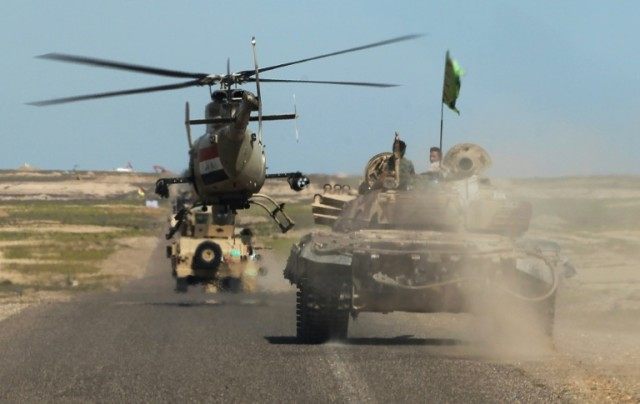Baghdad (AFP) – The United States will deploy additional forces to Iraq and make Apache attack helicopters available to support the country’s troops, US Secretary of Defence Ashton Carter said Monday in Baghdad.
President Barack Obama hailed the 2011 withdrawal of American troops from Iraq as a major accomplishment of his presidency, but the US has been steadily drawn back into the country since the Islamic State jihadist group overran swathes of territory in 2014.
Washington heads an international coalition that is carrying out strikes against IS and also providing training and other assistance to forces fighting the jihadists in both Iraq and neighbouring Syria.
“We are going to bring in additional forces,” Carter said after arriving in Baghdad on a surprise visit, without specifying the size of the new deployment.
A senior US defence official said around 200 additional American military personnel would be deployed, pushing the total figure past 4,000.
Carter also said that the Apaches — which can respond “quickly” and “dynamically” when needed — will support Iraqi efforts to surround and eventually recapture second city Mosul from IS.
And he pledged $415 million in assistance for the peshmerga forces of Iraq’s autonomous Kurdish region, which are fighting IS in the north.
Carter’s visit comes after a week of political turmoil that has been a setback for Prime Minister Haider al-Abadi, and the US defence chief has previously stressed the need to support the embattled premier.
– Political chaos –
Carter met with Abadi after arriving in Baghdad from the United Arab Emirates, his first stop on a Gulf tour during which he will seek to shore up support for Iraq.
He has said that “the success of the campaign against (IS) in Iraq does depend upon political and economic progress as well,” and that “it’s important that we continue to support” Abadi.
The premier has sought to replace the current cabinet of party-affiliated ministers with a government of technocrats, but has faced major opposition from powerful parties that rely on control of ministries for patronage and funds.
Abadi’s cabinet efforts were overshadowed by days of chaos in parliament, where lawmakers held a sit-in, brawled in the chamber and sought to sack the speaker.
The premier called on Monday for parliament to put aside its differences and do its job, saying he hoped a new cabinet would be approved “in the coming days”.
In addition to major security and political challenges, Iraq also faces a serious economic crisis caused by low oil prices and years of mismanagement and corruption by officials.
IS overran large areas north and west of Baghdad in 2014, but Iraqi forces have since regained significant ground from the jihadists.
Iraqi forces have begun preparatory operations in Nineveh province, of which Mosul is the capital, but the actual assault to retake the city is not expected for months, and possibly not until next year.
– String of Western visitors –
While most American forces in Iraq play advisory and support roles, Washington has also sent in special forces to carry out raids against IS, and US Marines have deployed to provide artillery support for Iraqi troops.
Obama repeatedly pledged that there would be no “boots on the ground” to combat IS, but US forces are engaged in combat with the jihadists and two American military personnel have already been killed.
An American Marine was killed in a rocket attack in northern Iraq last month, and a US special forces soldier wounded during a raid last year later died.
US-led forces invaded Iraq in 2003, overthrowing dictator Saddam Hussein and unleashing an insurgency and years of brutal sectarian violence due to poor planning and a lack of understanding of the country.
Rampant violence was eventually brought under control, and American forces withdrew at the end of 2011 after talks on a residual troop presence broke down over Washington’s insistence that they have parliament-approved immunity.
Carter’s trip to Iraq is the latest in a series of visits by senior Western officials in recent days.
US Secretary of State John Kerry travelled to Iraq two weeks ago to show support for the crisis-hit government, vowing to turn up the heat on IS.
And French Defence Minister Jean-Yves Le Drian came to Iraq last week, saying that Mosul and Raqa, IS’s main stronghold in Syria, “must fall” this year.

COMMENTS
Please let us know if you're having issues with commenting.